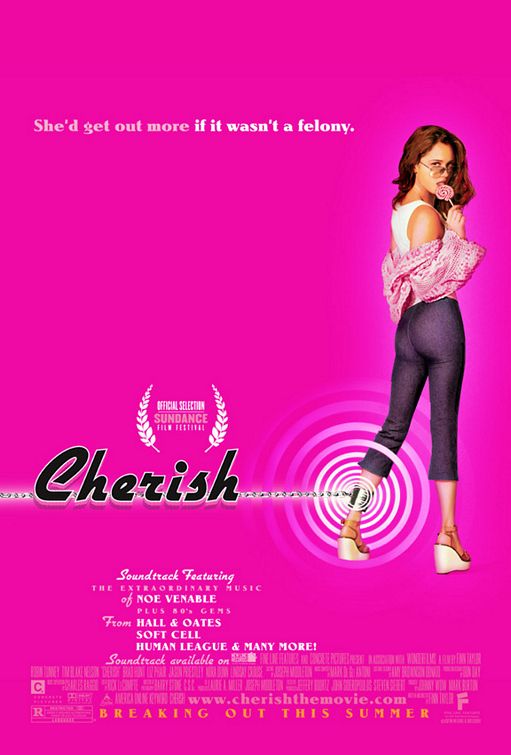"Coping with False Imprisonment"

| None | Light | Moderate | Heavy | |
|---|---|---|---|---|
| Language | ||||
| Violence | ||||
| Sex | ||||
| Nudity |
What You Need To Know:
CHERISH is slow-paced and uninteresting, though Robin Tunney does a good job as the damsel in distress. The movie also has a Romantic, non-Christian worldview and includes some politically correct content involving a homosexual midget who lives in Zoe’s new apartment building.
Content:
(RoRo, PC, HoHo, B, LLL, VV, S, N, AA, DD, M) Romantic non-Christian, unbiblical worldview with some PC content such as supporting character talks about “being” homosexual, complains about alleged persecution and has implied homosexual rendezvous one night; some moral content when character puts his job on the line to help young woman falsely arrested for drunk driving and manslaughter; 47 mostly strong obscenities and 14 strong profanities; action violence includes stalker forces woman to kill bicycle policeman with her car, woman falls down shaft, woman sees boy getting beaten up, and fighting; a couple sexual references and sexual scenes such as attempted fornication, implied homosexual encounter and sounds of couple and while having sex on their bed, with unclear images of their tangled bodies, while woman secretly, briefly watches; upper male nudity and partial female nudity but nothing really salacious; alcohol use and drunkenness; smoking; and, kidnapping, stalking, reckless driving, and heroine steals bicycle during attempt to clear her name and catch real killer.
More Detail:
CHERISH is an uneven romantic comedy/thriller that lacks the punch to attract a large audience and lacks the artistry to become an art house hit. In trying to attract both audiences, it probably will please neither.
In the story, Robin Tunney plays Zoe Adler, a pretty, fantasy-prone 29-year-old computer animator in San Francisco who has no friends, not even a man in her life. To soothe her soul, Zoe loses herself in a radio station’s playlist of sugary love songs from the 60s, 70s and 80s. One night, she takes a spin on the dance floor with her latest crush, Andrew. Tipsy, she goes to retrieve her cell phone from her car to have a rendezvous at Andrew’s place, but is surprised by the man who has been stalking her in the movie’s opening scenes.
Surprised, Zoe becomes a bizarre kidnapping victim, an episode that ends shortly thereafter when her captor forces her to drive into the path of a bicycle policeman. Knocked unconscious, Zoe wakes up to find herself charged with drunk driving and vehicular manslaughter. Even her own lawyer doesn’t believe her story of the unknown assailant and kidnapper.
The authorities put Zoe into the city’s electronic bracelet program and place her under house arrest in a warehouse loft apartment in a rundown part of town. Faced with both the loss of her freedom, two years of solitude without a computer and only the telephone and television to keep her company, Zoe has to be inventive. She tests the limits of her monitoring device and the patience of the quiet, conscientious deputy, Daly, who administers the bracelet program.
As the months pass and her trial date looms, Zoe learns that the killer who stole her life is still stalking her. With help from Daly and the friends she’s met looking out her window, she sets out to catch the killer and get back her life.
As a woman-in-danger thriller, CHERISH also tries to be a character study of a heroine who must learn how to cope with injustice, solitude and danger. Regrettably, writer and director Finn Taylor offers little entertainment value to pass the time as he tries to get viewers caught up in his heroine’s predicament. Some viewers may eventually find the movie enthralling, but we doubt they will like sitting through the slow pace at which Finn Taylor constructs the story.
Taylor also doesn’t give the killer any solid motivation, so most viewers probably won’t know whom they’re supposed to fear. Moreover, the shots where the killer forces Zoe’s car into the policeman are not completely clear, so some viewers may get confused and think that Zoe is actually guilty to a certain extent. The other action scenes are also shot in a serviceable manner that fails to give CHERISH the excitement it desperately needs. Thus, Taylor obviously needed to rethink the action scenes to make them more compelling. Many viewers (if not most), however, will sympathize with Zoe’s predicament, if only because of Robin Tunney’s solid performance.
Morally and philosophically, CHERISH has some problems. Although the movie has little political or religious content, it contains a Romantic, non-Christian worldview where the protagonist and other characters are subject to an unjust world that unfairly restricts one’s alleged freedoms. Zoe retreats to a fantasy world because the civilization around her is not a very nice one. She ends up becoming victimized by an evil stalker who has become obsessed with her. Happily, however, the movie doesn’t explicitly connect Christianity to this civilization, though it does have a minor character, a midget, who also happens to be a homosexual who complains about being persecuted as a Jew, a midget and a homosexual pervert. Zoe befriends the midget, who lives in her new apartment building. This politically correct subplot is a minor annoyance, but it does give a PC undertone to Zoe’s predicament. Like the midget and Daly, the policeman who also befriends her, Zoe is a friendless person lost in an uncaring, superficial civilization.
Of course, the joy of this world (and the next) is, as the great hymn proclaims, “What a friend we have in Jesus!” Though men may desert us, imprison us and kill our bodies, they cannot kill our souls.



 - Content:
- Content: 



